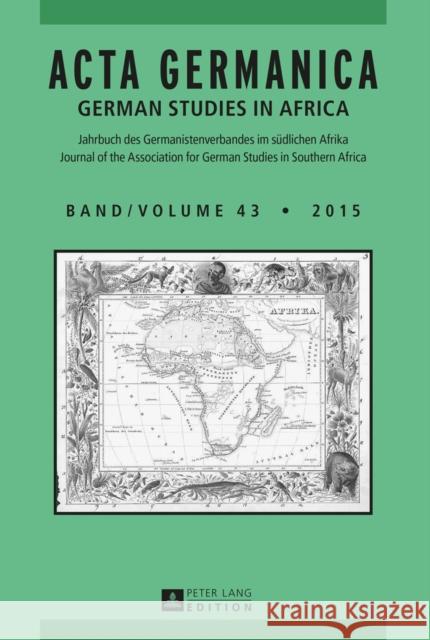ACTA Germanica: German Studies in Africa » książka
ACTA Germanica: German Studies in Africa
ISBN-13: 9783631671313 / Niemiecki / Miękka / 2015 / 273 str.
ACTA Germanica: German Studies in Africa
ISBN-13: 9783631671313 / Niemiecki / Miękka / 2015 / 273 str.
(netto: 367,14 VAT: 5%)
Najniższa cena z 30 dni: 383,42
ok. 10-14 dni roboczych.
Darmowa dostawa!
Der erste Teil -Afrika schreiben-, zugleich Schwerpunktsetzung des Jahrbuchs, versammelt Beitrage uber Afrikaverarbeitungen in der deutschen Literatur und im kulturellen Gedachtnis, die bezeugen, dass der afrikanische Kontinent nicht erst seit seiner Kolonisierung zu Imaginationen im europaischen Raum gefuhrt, sondern auch heute noch Relevanz hat. Der zweite Teil -Sprache und Ubersetzung- setzt sich mit Zusammenhangen von Sprache und Ubersetzung sowie Fragen der Zugehorigkeit und Identitat auseinander. Der dritte Teil enthalt eine Reihe von allgemeinen Beitragen zu literarischen Verarbeitungen des Ersten Weltkriegs, zu Aspekten kultureller und judischer Identitat, aber auch zu Identitatskonstruktionen in neuerer deutscher Literatur und Gegenwartsliteratur, genauso wie zu Lesekonventionen und Gattungsfragen. Der dritte Teil schliesst mit einem Beitrag zu Felicitas Hoppe ab. Zudem wird in einem Interview mit der Georg-Buchner-Preistragerin von 2012, das im Anschluss zu lesen ist, ihr Sudafrikabesuch im September 2014 gewurdigt.
The first part, entitled -Writing Africa-, is devoted to the focus of this journal. It comprises contributions which analyse the writing of Africa in German literary texts and in cultural memory thereby demonstrating that the African continent has not only been subject to the European imagination since it was colonised, but still holds relevance there today. In the second part of this volume, namely -Language and Translation-, contributions investigate the connection between language and translation and between belonging and identity. The third part contains a number of general articles, ranging from analyses of literary texts which were written about the First World War to aspects of cultural and Jewish identity as manifested in literary texts, from (de)constructions of identity in 20th century and contemporary German literature to examining conventions of reading and questions of genre. The third part concludes with an article on Felicitas Hoppe, winner of the Georg-Buchner-prize in 2012, followed by an interview with the author who visited South Africa in September 2014."











